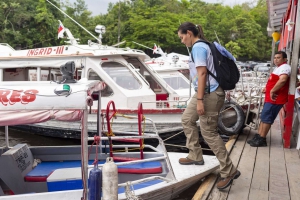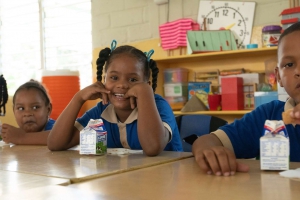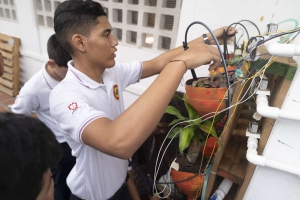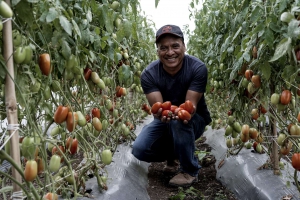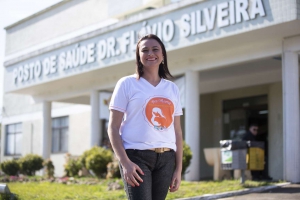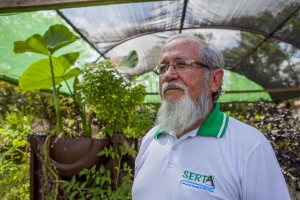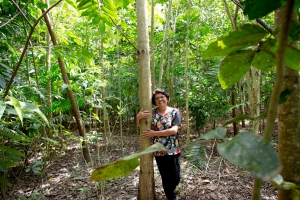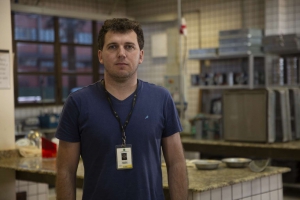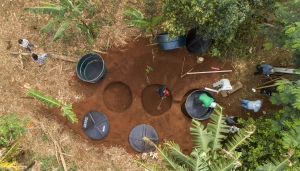
Marcilio Costa Bezerra
MAIN THEME: Health
The Better Early Childhood Program (PIM) brings unique intervention proposals, relevant to the reality of each family. The home visit are for the appreciation of the family, the home and the community as privileged spaces for the promotion of health and well-being. The activity performed directly in the houses allows the PIM team to know the family structure and dynamics and to identify potentialities and risk factors.
GOALS
Through home visitation, PIM aims to promote the stimulation of child development, the strengthening of family ties and the identification of the specific needs of each individual benefited.
DESCRIPTION
In the most vulnerable areas of Rio Grande do Sul, worrying figures of underprivileged and underweight children and high mortality rates were observed. It was necessary to intervene, especially in the early childhood phase, as families were removed from the education and health network.
The PIM program has helped to change this scenario. Through family home visits, it encourages child development, identifying specific needs of each beneficiary and strengthening family ties. The visits use recreation as technology, a strategy that strengthens the construction of knowledge and care practices favorable to the integral development of the child.
Visitors revitalize expressions of affection, creativity and fantasy. Guidelines and games are proposed in order to contemplate the child development or the gestational period of each beneficiary. After the sessions, the PIM is able to identify important aspects about each household as well as the community.
RESULTS ACHIEVED
In 2016, PIM served as a model for the nationwide home visiting program, the Happy Child Program. In addition to enabling important listening work in underprivileged communities, PIM has helped to reduce the infant mortality rate by valuing affection and attention in the family environment. More than 200,000 children and 50,000 pregnant women have already been attended.
CONTACT
Address: Avenida Borges de Medeiros 1501 - Centro - Porto Alegre (RS)
E-mail: This email address is being protected from spambots. You need JavaScript enabled to view it.
Phone number: (51) 3288-5888
MAIN THEME: Health
The Riverside Early Childhood Initiative (PIR), created in 2012, aims to address a specific problem that exists in traditional Amazon communities to access basic health services for pregnant women and children from zero to six years old. Thus, PIR aims to improve the method of home visitation focusing on the integral development of riverside children, by training Community Health Agents.
GOALS
Contributing to the development of caregivers of children, strengthening the bond between parents and children, and developing skills of community health workers.
DESCRIPTION
The PIR trains community health workers to assist in health monitoring in Tefé riverside families, in the Amazon, and contributes to the development of children in the region.
The first step is to build a bond with the municipality, involving the Secretariats of Health, Education and Social Assistance. Then, the knowledge of health agents is improved and community agents are formed.
Every agent receives a training course on child rights, breastfeeding, child health handbook, among other topics related to pregnant women. The Sustainable Amazon Foundation has also developed the Home Visitation Guide and a form installed on tablets, which helps to feed the state of Amazonas with data from these regions.
RESULTS ACHIEVED
The initiative served as the basis for the creation of a public policy of Early Childhood in the Amazon and contributes tools towards reaching all children in the state, regardless of where they live.
CONTACT
Address: Rua Álvaro Braga, 351 - Parque 10 de Novembro – Manaus (AM)
E-mail: This email address is being protected from spambots. You need JavaScript enabled to view it.
Phone number: (92) 4009-8900
MAIN THEME: Environment
This initiative promotes environmental awareness and solid waste management habits in schools and homes. With students and teachers of 3R, they learn the importance of reducing, recycling and reusing solid waste in schools.
GOALS
Facilitating changes in the culture of students and the entire school community for social, economic and environmental sustainability by establishing management habits and proper waste disposal in each school center involved, even use and recycling.
DESCRIPTION
The R for reduce means that the use of plastic containers such as lids and cups should be reduced. The R for reuse symbolizes the reuse of articles such as paper, folders and books. the R for recycling consists of sorting, sorting and storing solid waste and then turning it into new products.
RESULTS ACHIEVED
The initiative has already managed to: train 440 teachers, train 3,750 students as Environmental Delegates and 2,062 students as Environmental Leaders, form 65 trained Committees for 3R Managers and impact more than 50,000 people.
CONTACT
Address: Calle Augusto Sanchez nº 41 – Piantini - Santo Domingo / República Dominicana
E-mail: This email address is being protected from spambots. You need JavaScript enabled to view it.
Phone number: 809 753-2750
MAIN THEME: Education
If the problems students experience in their local communities are not taken into account, all the knowledge shared in the traditional school can often become irrelevant. The Atlantic Waves Program emerged with the aim of encouraging scientific and technological thinking since childhood, so that children understand and contribute solutions to the reality in which they are inserted.
GOALS
The goal is that, through research, children and young people will be protagonists in a cycle that involves their own intellectual growth and vocation, as they create innovative alternatives that help in the development of their region.
DESCRIPTION
The first stage is the formation of groups in which children and young people are the main protagonists, generating spaces for socialization and negotiation. In the second stage of this methodological route there is the disturbing question that arises from each child or young person who, by their critical capacity, observation and amazement, wishes to understand their reality.
RESULTS ACHIEVED
In operation since 2008, the Atlantic Waves Program has already allowed the support of 350 research groups, composed of 28.5 thousand children and 497 teachers, awakening in all the love for science and social transformation.
CONTACT
Address: Cra 54 Nº 59 - 102 - El Prado – Barranquilla / Colômbia
E-mail: This email address is being protected from spambots. You need JavaScript enabled to view it.
Phone number: 57 3106013657
MAIN THEME: Food
The purpose is to strengthen household and community incomes by linking agricultural productivity with public procurement in the Ch'orti region. Women's participation is prioritized, generating empowerment and participation to ensure the well-being of individuals, groups and communities.
GOALS
Improving the general standard of living of indigenous families in the Ch'orti region through strategic alliances for the sale of agricultural products, based on the school feeding law in the country (Decree-Law N° 16/2017), attending the school and the common good.
DESCRIPTION
Since 2006, the Chorti Fresca Association has promoted an innovative project that is committed to improving the quality of life of the Ch'orti indigenous population. The initiative aims to include the feeding of children from public facilities, making effective the school feeding law through participation of the community.
RESULTS ACHIEVED
The results are broad, improving the general standard of living of indigenous families in the Ch'orti region. But it is noteworthy that, so far, 460 families have already implemented 100 hectares of the Kuxur Rum agroforestry system (“my wetland” in Ch'orti language) as a climate change adaptation measure for production in the dry corridor.
CONTACT
Address: Barrio San Sebastián, Jocotán Chiquimula / Guatemala
E-mail: This email address is being protected from spambots. You need JavaScript enabled to view it.
Phone number: 502 40321095
MAIN THEME: Health
The Pró-Mamá program was created by the Extended Family Health and Primary Care Center (In portuguese NASF). In order to increase the population's access to the program, the team invested in social media and created a breastfeeding and child development app from 0 to 2 years old.
GOALS
Increasing breastfeeding rates, preventing early weaning and ensuring physical and emotional health for both mother and baby during breastfeeding.
DESCRIPTION
The first measure of the program was to form a multidisciplinary team, composed of nutritionists, speech therapists and psychologists. Thus, health professionals are trained to work both during home visits and to attend at Health Units, providing information on the benefits of breastfeeding for children from 0 to 2 years old.
In order to increase the care network, the program has also developed its own content for social networks as well as a free app, where the mother can record and monitor the child's development through feeding tips.
Digital technology is no substitute for face-to-face care, but through social media, it was possible to reach more people who were far from the public system, and turn the app into a powerful tool for measuring breastfeeding data in the town.
RESULTS ACHIEVED
With data collected between 2016 and 2017, Pró-Mamá was able to register an increase from 47.09% to 54% in the exclusive breastfeeding rate for children from 0 to 6 months. The goal now is for social media to reach more people.
CONTACT
Address: Rua Garibaldi, 255 - Sulbrasileiro – Osório (RS)
E-mail: This email address is being protected from spambots. You need JavaScript enabled to view it.
Phone number: (51) 3601-3321
MAIN THEME: Education
By identifying the need to value the knowledge and culture of the people of the Ibirim community, in Pernambuco’s Rural Zone, the Alternative Technology Service created a teaching methodology that went beyond the walls of the schools and started to be carried out by several people from the region.
GOALS
Providing a methodology that facilitates teaching and learning by encouraging rural people to rescue their own identities and thereby build a new way of gaining knowledge and training educators in the local community.
DESCRIPTION
It is possible to learn from the heart. It was from this thought that the Educational Program for Supporting Sustainable Development developed a teaching system that invites students to tell their own stories. From there, the educator uses the student's reality to teach reading, writing, calculating, while building fundamental values for living in the field: self-esteem, identity, origin, territory, family and work.
RESULTS ACHIEVED
With the success of the idea, the methodology started to be applied in technical courses of Agroecology for graduating professionals. It is a feedback system because the more you know about your region, the more people want to study it. A learning that happens in solidarity, causing everyone to be participant and arousing a sense of belonging.
CONTACT
Address: Povoado Poço da Cruz, Açude Engenheiro Francisco Saboya - Zona Rural – Ibimirim (PE)
E-mail: This email address is being protected from spambots. You need JavaScript enabled to view it.
Phone number: (81) 3658-1265
MAIN THEME: Environment
SUMMARY
Technology is an instrument that aims to bring society closer and raise awareness about the importance of forests from the point of view of preservation and development of the ecosystem. Reforestation promotes the return of the region's biodiversity.
GOALS
Promoting the reforestation of degraded areas and make society aware of the importance of the forest.
DESCRIPTION
Amazon deforestation is a worldwide concern. The reduction of their plant mass impacts the disappearance of species of fauna and flora and, consequently, the life of this ecosystem.
The Miyawaki System performs environmental analysis of soil, water, climate, geography, and local neighborhood.
During the planting period, the ASFLORA Institute, responsible for the System, in partnership with other institutions, holds events in schools, public and private agencies, in which civil society and academia actively participate in the reconstruction of this habitat. As a result, the system also becomes an environmental education and research initiative open to all.
RESULTS ACHIEVED
Between 2001 and 2019, more than 40 social technologies were implemented, totaling about 200,000 seedlings planted in local ecosystem recovery projects.
CONTACT:
Address: Rodovia BR 316, Km 25, S/N – Cajueiro, Benevides (PA)
E-mail: This email address is being protected from spambots. You need JavaScript enabled to view it.
Phone number: (91) 3724-1106
MAIN THEME: Environment
The initiative seeks to generate income for cooperatives through the presentation of solutions for the use of glass waste in municipal landfills with the commercialization of powdered glass for application in civil construction.
GOALS
Developing sustainable methodologies applicable to the reuse of glass waste found in landfills. Promoting solutions and products with higher added value, thus enabling the strengthening and construction of a regional glass recycling chain.
DESCRIPTION
Glass waste recycling is a serious environmental problem in cities far from industrial production centers. In addition, it is a low-paid activity for cooperatives and waste collectors, making the material difficult to dispose of.
Faced with this problem, the Federal Technological University of Paraná created the initiative by presenting a solution in which powdered glass is used in civil construction replacing sand.
It is used in the manufacture of curbs and benches provided by the city hall in various neighborhoods. That is, the garbage that was once thrown in landfills and vacant lots turns out to benefit the city.
RESULTS ACHIEVED
Since powdered glass is worth up to 25 times more than glass found in landfills, the initiative allows financial aid in the budget of waste collector’s families and cooperatives. In addition, there was a large decrease in environmental impact, as the city of Toledo generates approximately 30 tons of discarded glass each month.
CONTACT:
Address: Rua Cristo Rei, 19 – Vila Becker, Toledo (PR)
E-mail: This email address is being protected from spambots. You need JavaScript enabled to view it.
Phone number: (45) 3379-6800










